Micro Clover Maybe?
- southmidwoodpollin
- Oct 7, 2024
- 2 min read
Updated: Jan 23, 2025

I had long seen Microclover touted as an alternative to traditional grass seed, so last fall I decided to give it a go. I sowed a mix of grass and clover seed on the tiny bit of lawn we set aside for our dog's pleasure. The idea of Microclover is that the small leaf gives a more velvety appearance and the clover requires little water and readily spreads, edging out weeds.
Now I am no fan of lawns. In fact, once the ground was prepped and seeded last October, I promptly forgot all about it.

That is until late September when I looked up from my veg patch and realized that after a month of no rain and definitely no watering on my part, the Microclover was green while the rest of my grass looked dead. And the clover, which spreads by underground stolens, was expanding its territory with no effort on my part.
Here are a few more good reasons to consider clover:
Microclover fixes nitrogen from the air and puts it in the soil.
How amazing is that? Nitrogen is the N in NPK of fertilizer fame. Clover actually makes your soil healthier. No pricey fertilizer required.
Microclover is water wise, as my patch clearly indicates.
Microclover needs minimal mowing to appear tidy.
Sparrows don't like Microclover seed. Hurrah! A big plus for me because sparrows happily gobble up whatever other grass seed I put down in the past.
Microclover blooms and provides safe forage for bees in early summer. If you don't want bees for some reason, mowing will remove the flowers.
Microclover is said to remain green all winter. I have to wait and see on that one.
The only difficulty with Microclover is that you will probably have to order the seed online. Big box stores generally stock standard clover seed, if they have it at all.
Onward and upward, Virginia
